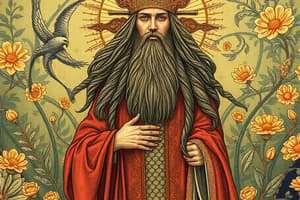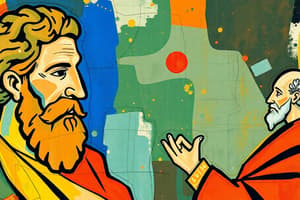Podcast
Questions and Answers
What are the two components of the self according to Socrates?
What are the two components of the self according to Socrates?
According to St. Augustine, how does one express love for God?
According to St. Augustine, how does one express love for God?
What does John Locke's concept of 'Tabula Rasa' refer to?
What does John Locke's concept of 'Tabula Rasa' refer to?
What are the two main factors that influence physical self according to the content?
What are the two main factors that influence physical self according to the content?
Signup and view all the answers
What is the focus of George Herbert Mead's theory?
What is the focus of George Herbert Mead's theory?
Signup and view all the answers
What type of culture consists of intangible products created by a society?
What type of culture consists of intangible products created by a society?
Signup and view all the answers
What is described as the basic institution associated with economic activities?
What is described as the basic institution associated with economic activities?
Signup and view all the answers
In which structure did Plato associate the individual soul's components with societal roles?
In which structure did Plato associate the individual soul's components with societal roles?
Signup and view all the answers
What does St. Thomas Aquinas assert about self-knowledge?
What does St. Thomas Aquinas assert about self-knowledge?
Signup and view all the answers
Which of the following is NOT one of the basic gender stereotypes mentioned?
Which of the following is NOT one of the basic gender stereotypes mentioned?
Signup and view all the answers
According to the framework presented, the 'ideal realm' is characterized by which of the following?
According to the framework presented, the 'ideal realm' is characterized by which of the following?
Signup and view all the answers
What concept does Immanuel Kant introduce regarding the self?
What concept does Immanuel Kant introduce regarding the self?
Signup and view all the answers
What term does John Locke use to describe the state of human beings at birth?
What term does John Locke use to describe the state of human beings at birth?
Signup and view all the answers
Which philosopher is known for the assertion that 'experience is the best teacher'?
Which philosopher is known for the assertion that 'experience is the best teacher'?
Signup and view all the answers
Which of the following best describes George Herbert Mead's theory of the self?
Which of the following best describes George Herbert Mead's theory of the self?
Signup and view all the answers
What is the focus of anthropology as mentioned in the content?
What is the focus of anthropology as mentioned in the content?
Signup and view all the answers
Study Notes
Ancient Philosophers
- Socrates: Believed the self is composed of two realms: the physical, which is constantly changing and deteriorating, and the ideal realm, which encompasses unchanging concepts like beauty, truth, and goodness.
- Plato: Extended Socrates' ideas by proposing a triple class structure in society, mirroring the three aspects of the individual soul: appetite, spirit, and reason.
- St. Augustine: Emphasized the importance of loving God and one's fellow humans, advocating for non-harm and the Golden Rule ("Do unto others as you would have them do to you").
- St. Thomas Aquinas: Argued that self-knowledge stems from experiences of the world, suggesting that "experience is the best teacher."
Modern Philosophers
- John Locke: Introduced the concept of tabula rasa, suggesting that the mind is a blank slate at birth and is shaped by experiences.
- David Hume: Emphasized the role of senses and experiences in forming the self.
- Rene Descartes: Proposed the famous phrase "Cogito, ergo sum" ("I think, therefore I am"), separating the mind (Cogito) from the body (Extenza).
- Immanuel Kant: Distinguished between the inner self (mind) and the outer self (appearance), suggesting that we perceive ourselves differently from how others do.
Sociology of the Self
- Modern Society: The self is viewed as a product of social interactions and cultural influences.
- Postmodern View: The self is seen as fluid and constantly evolving, influenced by various social constructs.
- Artistic Creation: The self can be viewed as an artistic creation, constantly shaped and redefined by individual choices and experiences.
- Social Groups and Networks: Individuals connect with others through shared characteristics (social groups) and interconnected relationships (social networks).
- Five Basic Institutions: Family, economics, religion, education, and the state play crucial roles in shaping the self.
Gender Stereotypes:
-
Four Basic Kinds:
- Personal traits: Expected personality traits based on gender.
- Domestic behaviors: Expectations for household responsibilities.
- Occupations: Traditional roles and professions associated with each gender.
- Physical appearance: Social norms regarding how men and women should look.
The Physical Self
- Nature: The influence of inherited traits from parents.
- Nurture: The sum of experiences and environmental factors a person encounters throughout life.
- Growth: Physical changes occurring in an individual over time.
- Development: The overall growth and maturation of a person throughout their lifespan.
Mead's Theory of the Social Self
- The Self: The concept of oneself, developed through social interactions.
-
The "I" and the "Me":
- "I": The spontaneous, impulsive part of the self.
- "Me": The socialised part of the self, influenced by societal norms and expectations.
Ancient Philosophers
- Socrates: Believed the self is composed of two realms: the physical realm (changing and deteriorating) and the ideal realm (unchanging and eternal).
- Plato: Argued that societies have three classes, reflecting the three parts of the individual soul: appetite, spirit, and reason.
- St. Augustine: Emphasized that loving God means loving humanity, and loving humanity means never harming others.
- St. Thomas Aquinas: Claimed that self-knowledge comes from our experience of the world around us.
Modern Philosophers
- John Locke: Proposed the concept of "tabula rasa" (blank slate), suggesting that the mind is born without innate ideas.
- David Hume: Emphasized the role of senses and experience in forming our understanding of the self.
- René Descartes: Famous for the phrase “Cogito, ergo sum” (I think, therefore I am), emphasizing the importance of the mind (cogito) over the body (extensa).
- Immanuel Kant: Distinguished between the inner self (mind) and the outer self (appearance).
Anthropology & Sociology
- Anthropology: Explores material culture (physical objects created by society) and non-material culture (intangible ideas and values).
-
Sociology:
- Views the self as a product of modern society.
- Emphasizes the self as an artistic creation, shaped by personal choices and experiences.
- Studies how social groups (2 or more individuals with shared characteristics) and social networks (connections linking individuals to the group) influence the self.
Social Institutions
- Five Basic Institutions: Family, Economics, Religion, Education, and State.
- Gender Stereotypes: Include notions about personality traits, domestic behaviors, occupations, and physical appearance.
George Herbert Mead
-
Theory of the Social Self: Explains the self as a product of social interaction, consisting of:
- "I": The spontaneous, impulsive part of the self.
- "Me": The socialized, reflective part of the self.
The Physical Self
- Heredity (Nature): Transmission of traits from parents to offspring.
- Environment (Nurture): The sum of all experiences an individual undergoes from conception to old age.
- Growth: Physical changes in an individual.
- Development: Overall growth of a human throughout their lifespan.
Studying That Suits You
Use AI to generate personalized quizzes and flashcards to suit your learning preferences.
Related Documents
Description
Explore the key theories and contributions of influential philosophers from ancient times like Socrates and Plato to modern thinkers such as John Locke and David Hume. This quiz delves into their views on self, knowledge, and ethics, providing insights into how philosophical thought has evolved. Test your understanding of these foundational ideas shaping human thought and society.




